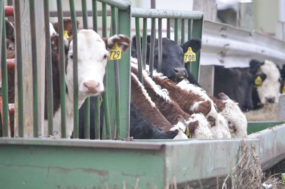We believe agribusiness operates differently, that a handshake and a person’s word can be trusted, but with examples of fraud occurring in the last couple of decades, such as ADM (price fixing), Ahold (fraudulent financial reporting) and the latest, Eastern Livestock, Co. LLC (alleged check kiting and failure to pay livestock producers), agribusiness is anything but immune to unsavory business practices.
Clearly, sophisticated deal making is now the rule for all parties in today’s agribusiness.
The Grain Inspection, Packers and Stockyards Administration (GIPSA) now estimates that $130 million is owed to 743 sellers in 30 states. When we consider the fact that Eastern only had a bond of $875,000 on file with the feds, no one is going to look out for your best interests better than you, including the U.S. government.
Consequently, we believe a potential solution is for the cattle industry to regulate itself with an Internet-based clearinghouse which provides all parties the transparency which might negate another Eastern Livestock crisis. We will discuss this solution in a subsequent article.
In light of the Eastern Livestock debacle, other well-known frauds and the changes in our economy since 2008, formal contracts are an increasingly important aspect of a rancher’s role in agricultural production and marketing.
Eastern Livestock’s recent bankruptcy reminds us of the dire consequences of handshake deals. You should view contracts as a risk management strategy even beyond the financial ramifications associated with a contract.
However, if the party opposing you touts a contract as an ironclad way to insulate from financial risk, you should note that quite the opposite is true – while contracts may effectively manage risk, they can also bring great financial risk.
An example of the financial risk associated with contracts that were marketed as risk management tools for agricultural producers are the contracts between Pilgrim’s Pride and its contract poultry growers. When Pilgrim’s Pride filed Chapter 11 bankruptcy,
it cancelled over 300 contracts which were used by the growers and their lenders as a stream of income leveraged to build and finance the farms. Unfortunately, when Pilgrim’s Pride unilaterally cancelled these contracts, the farmers and lenders were left to manage the financial crisis resulting from a situation which they thought was effectively managed by the contract.
When evaluating a contractual opportunity, ranchers should keep in mind a contract’s basic definition: A contract is a binding agreement between two or more parties that is enforceable by law. In order for a contract to become a binding agreement between the parties, the following elements, at a minimum, are required:
- identifiable and competent parties
- mutual agreement
- consideration
- legal subject matter that does not violate public policy
Generally, an enforceable contract will typically provide you with status as an unsecured creditor in the other party’s bankruptcy other than by the contractual promise to pay. Beyond these essential aspects, ranchers should consult with their legal counsel and accountants when considering any contract.
Outside of your paid advisers, you should be mindful of the following:
- Regardless of history, always assume the party drafting the contract did so in a fashion that is advantageous to them, not you.
- To ensure you are paid for what you deliver, know the other party’s current financial situation and performance history; do not be afraid to ask for support of the other party’s financial stability or request a letter of credit or some other agreement to ensure your payment.
- Never rely on oral communications between the parties before or after the contract is signed. If you cannot get it in writing, be sure to keep copies of any documents demonstrating an agreement.
- Before signing a contract, ask yourself what will happen if the buyer goes out of business or doesn’t pay; after signing, you are an unsecured creditor in the other party’s bankruptcy.
- Don’t be afraid to ask someone to get things in writing. If someone feels that things can be worked out without a legal contract, you should discuss the benefits to both sides, and if the counterparty still is reluctant to sign a contract, reconsider the business relationship.
Although there may be no way to protect yourself 100 percent, you can use the information given above in your overall risk management when weighing contractual options in your business. These are vital considerations to reduce your chances of being a victim of fraud, and to keep your money in your pocket. Unfortunately, after the Eastern Livestock crisis, the gentlemen’s agreement is outdated and we must continue to evolve how we conduct business. ![]()
Jason Thomas (pictured), CPA, JD has legal, investment banking and accounting experience with agribusiness industries and is also with Frost, PLLC in Little Rock, Arkansas.
T.J. Boyle, CPA has extensive accounting and consulting experience with agribusiness industries including cattle and beef with Frost, PLLC in Little Rock.









